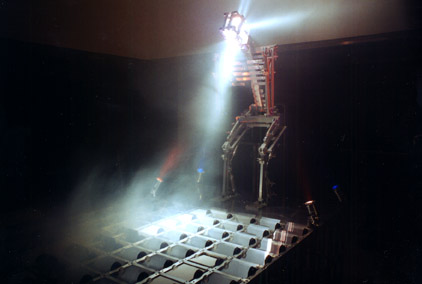Stèle
01 is part of a trilogy entitled The Artificial Death Series. This
installation project is based upon Artificial Life concepts and simulacra
and the age-old fascination of the public for automatons. The cybernetic
stele is composed of a sensing network (presence detection sensors),
a robotic sculpture, a digital video projection system and a computerized
matrix screen.
A
humanoid robotic statue stands up on an aluminum and plexiglas stele,
covering its face with its hands. Video images representing human death
are projected on the stele's surface which is in fact a mosaic of smaller
revolving plates acting sometimes as screens sometimes as mirrors. When
viewers are approaching by the stele, the robot statue removes its hands
from its face, spreads its arms, and changes itself into a machine.
The video screen starts to move and images are deconstructed and morphed;
an impossible life takes over this artificial momument.
Inspired
by mortuary steles from the Père Lachaise cemetery in Paris,
this piece aims to evoque the undissociable dichotomy between the real
and the virtual, life and death, movement and inertia, men and machines.
The goal of this project is to build an interactive installation evoquing
through a mortuary stele the passage from reality to virtuality. It
is composed of 3 main elements: a robotic statue, a computer-controlled
video screen and an interactive sensing system.
The
robotic statue is made of aluminum and is about 1.25m high. It is articulated
by a set of 10 pneumatic cylinders. These cylinders are triggered by
a computer using the Max programming software. The statue is a complex
humanoid-looking robot that is able to move its hands and arms and that
is able to transform itself into a more abstract object.
Video
images are projected onto the surface of the stele. The video screen
is a matrix of 128 smaller plates revolving with the help of stepper
motors. Each side of a plate is either a white screen or a reflecting
mirror.Video
images are then animated by the overall movement of these plates. A
computer controls the rotation of each plate and generates shapes and
patterns using cellular logic as programming basis.
The
installation uses pyroelectric sensors as presence sensing system. 32
sensors are located around the periphery of the stele and 64 sensors
are integrated in the matrix screen. This system detects when viewers
are approaching the stele and when viewers move their hands on top of
the screen's surface. A custom interface sends the sensing signals (on/off)
to the Max control software.

